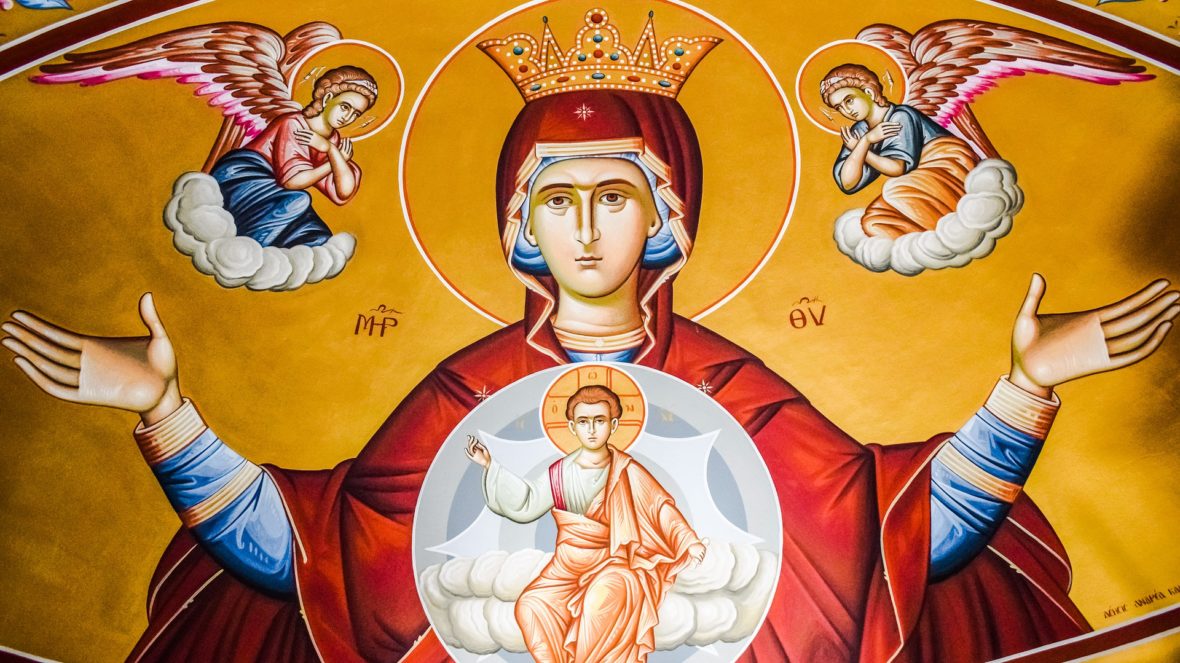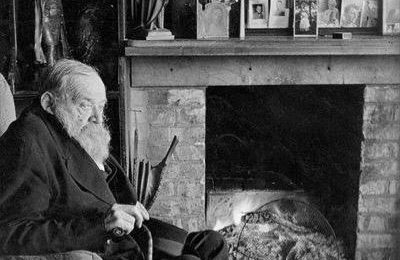As Catholics we are often asked what is the Immaculate Heart of Mary, and why do we hold it in such high esteem? Why do we love it? To grow in knowledge of the Immaculate Heart of Mary, I am reprinting a post from this past August (with some modifications) which was published on the feast of the Immaculate Heart of Mary. And, with this re-post, I say a Hail to her who believed the words spoken to her; and gives us Our Savior next week:
Today is the feast of the Immaculate Heart of Mary in the traditional Roman Catholic calendar…for this post, I am focusing on the feast of the Immaculate Heart of Mary, a beautiful feast to honor the pure heart of Our Holy Mother. The following is a bit long, but it is wonderful to read, perhaps in leisured moments through the weekend, to learn more about the Blessed Virgin Mary and her Immaculate Heart. This text discusses the teachings of St. John Eudes on the Immaculate Heart of Mary, and how the Immaculate Heart of Mary relates to the Sacred Heart of Jesus. St. John Eudes wrote the beautiful book, The Admirable Heart of Mary, which is a must have book for your book shelf. But for now, let’s read from The Immaculate Heart of Mary, The Cordimarian Devotion of St. John Eudes by Henry M. Camacho, O.P.:
St. John Eudes was convinced that “a man is not a true Christian if he has no devotion to the Mother of Jesus Christ and of all Christians … conversely, it is impossible for anyone to
perish upon whom she looks with favor.” The Saint realized, however, that the human will is moved to love only when the intellect presents what is worthy of our respect and esteem. He
therefore wrote his incomparable devotional classic, The Admirable Heart of Mary, a compendium of praise to the Mother of God culled from Sacred Scripture and the writings of the Fathers and theologians of the Church. In this volume, he distinguished a trinity of Hearts in Mary: the Corporeal, the Spiritual, and the Divine.
The Corporeal Heart of Mary, her heart of flesh, is not the dominant aspect in his devotion to the Heart of Mary. The real, yet subordinate role he assigns to Mary’s physical heart harmonizes well with the corresponding doctrine on the Sacred Heart recently clarified in the encyclical Haurietis Aquas.The Spiritual Heart of Mary, the superior part of Mary’s soul, includes her intellect, memory and will, but primarily and principally her love and charity. This “furnace of love,” symbolized in her Corporeal Heart, mirrors her love for God and her charity for mankind.
The Divine Heart ordinarily means the Incarnate Word, Jesus living in her, the gem in its setting: the Divine Son in the Heart of the Virgin Mother. He incorporated this beautiful concept in the Invitatory of the Office of the Heart of Mary which he wrote for his spiritual sons and daughters : “Jesum in Corde Mariae regnantem, venite adoremus.” But sometimes he assigns the name, the Divine Heart, to the Holy Ghost or to the complete Trinity as is evident from the doxology which ends the hymns for this same Office of the Heart of Mary: “0 Sacrosancta Trinitas, Aeterna vita cordium, Cordis Mariae sanctitas, In corde regnes omnium.”
However, it is in his most famous work, The Kingdom of Jesus, that we find the most precise elaboration of the principles governing devotion to Mary as he conceived it.
He taught first of all that we must not separate Jesus and Mary but unite them in our devotions. “Jesus and Mary,” the Saint writes, “are so closely connected that he who sees Jesus sees Mary, and he who loves Jesus loves Mary; he who has devotion to Jesus has devotion to Mary. Jesus and Mary are the two chief foundations of the Christian religion, the two sources of all our blessings, the two subjects of our devotions and the two to whom we must look in all our actions and devotions.” The Saint speaks of the Sacred Hearts of Jesus and Mary as “one” Heart by reason of the intimate union existing between them, almost perfect union and conformity of spirit, of will, and of feeling. The Heart of Jesus is of course distinct from that of Mary and surpasses it infinitely in excellence and holiness. Yet God has
so closely united these two Hearts that there has never been and never will be a closer union. “Thus the Sacred Heart of Jesus is the Heart of Mary. These two Hearts are but one Heart …
which was given to us by the Blessed Trinity and by our Blessed Mother, so that we, the children of Jesus and Mary, might have but one heart with our Heavenly Father and our holy Mother and that we might love and glorify God with the same Heart, a Heart worthy of the infinite grandeur of His Divine Majesty.” Thus as Mary and Jesus are inseparable in life, they also ought to be inseparable in our devotion.The second principle he proposes is that we ought to honor Jesus in Mary and Mary in Jesus. “You must see and adore her Son in her and see and adore Him alone. It is thus that she wishes to be honored, because of herself and by herself she is nothing but her Son Jesus is everything in her, her being, her life, her sanctity, her glory, her power and her greatness.” In truth, this is why Christian tradition has honored Mary. Jesus is Mary’s reason of being. Mary’s reason of being is to give Jesus. “Do you not know that not only is Jesus resting and dwelling continually in the Heart of Mary but that He is Himself the Heart of Mary … ” As Father Llameras, O.P., writes: “St. John Eudes made the object of this devotion (Cordimarian) not only the Physical and Spiritual Heart of Mary but also her Divine Heart, that is Jesus living in her, Who being the life of her life is the Heart of her Heart. In this way, Cordimarian veneration has reverted into homage of Jesus, according to the Saint’s formula
appearing in the Invitatory of Matins of the liturgical Office of the Heart of Mary: Jesum in Corde Mariae regnant em, venite adoremus.”Thus whoever yearns for Jesus seeks Mary and whoever finds the Heart of Mary beholds Jesus reigning fully. Through the Heart of Mary souls penetrate into the Sacred Heart of Jesus and the veneration of Mary’s love grows into adoration of the infinite love of Jesus. The love St. John Eudes lavished on the most pure Heart of Mary is love for Jesus Himself. He sings with one single hymn, Ave Cor Sanctissimum, of this love for the Admirable Heart of Mary and for the Adorable Heart of Jesus. Nor does this indicate any confusion in his mind of the honor due to Mary (hyperdulia) and the supreme honor due to her Divine Son (!atria). St. John Eudes rightly understood that all honor rendered to the Blessed Virgin and to the saints implies homage to the Person of Jesus and ultimately to the Blessed Trinity: “0 Sacrosancta Trinitas .. . In Corde regnes omnium.”
A third principle inculcated by St. John Eudes is that we ought to model ourselves on Jesus in the practice of devotion to Mary. “As you must continue the virtues of Jesus and keep with
you His sentiments, so also you must continue and maintain in your hearts the love, tenderness and devotion that Jesus cherished for His Blessed Mother. He loved her most perfectly and accorded her the very highest honor in choosing her to be His Mother, giving Himself to her as Her Most Beloved Son, taking from her a new being and life, becoming subject to her, following her guidance in outward things during His Childhood and hidden
life, afterwards crowning her Queen of heaven and earth, glorifying her and causing her to be glorified by the whole world.” The Saint accordingly urges us to “honor her first as the Mother of God, then as your own Mother and Queen. You must thank her for all the love, glory, and perfect service she has rendered to her Son Jesus Christ our Lord. You must refer to her, after God, your being and your life, subjecting yourself entirely to her as her
slave, imploring her to direct you in all your affairs and to assume full power over you, as over something belonging entirely to her and to dispose of you as she pleases, for the greater glory of her Divine Son. You must beg her to employ all your actions to honor the infinite works of her Son, and to associate you with all the love and praises which she ever gave Him and ever shall give Him throughout eternity.”Those who approach her with this childlike trust and confidence of St. John Eudes will find that Mary is truly our heavenly mother. She consoles us when we are sad, reassures us when we are afraid, guides us when we wander from the right path, strengthens us in timidity, encourages us when weakness overwhelms us, gives us fresh confidence in our hesitation, guards us against the attacks of Satan and teaches us to follow the way of the Cross. Through Mary Jesus comes to us; through Mary we come to Jesus. She who was His Mother in the flesh becomes the spiritual mother of us all. It was filial knowledge of this spiritual kinship which prompted the Saint to pray: “Omnipotent God, Who didst will the Heart of the Blessed Virgin Mary to be the sanctuary of the Divinity, the throne of every virtue and the
treasure of all sanctity, grant, we beseech Thee, through the merits and prayers of this most Holy Heart, that we may unceasingly bear the likeness of her in our heart; so that, in imitation of her, by accomplishing all that is most pleasing to Thee, we may merit to become eternally conformed to Thy Heart. Through Our Lord Jesus Christ. Amen.”Thus Cordimarian devotion honors the Blessed Mother under the symbolism of the Heart as it reflects her love and sanctity. It is universally accepted as the most excellent of devotions
to Our Blessed Mother. It is not simply another Marian devotion. It is rather the crown, summation, and synthesis of all other particular Marian devotions. The consideration of Mary’s Heart, of her great love for God and for man, awakens a desire in the hearts of her children to return that love by acts of consecration and reparation to her Immaculate Heart. (source)
May you have a beautiful day; and, may the Immaculate Heart of Mary be loved by all.
~SCF
Image: as noted by St. John Eudes (above), Jesus is enthroned in the Immaculate Heart of Mary.






